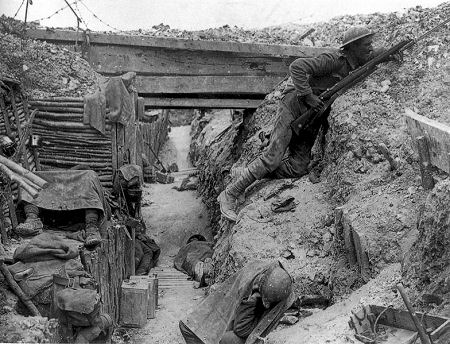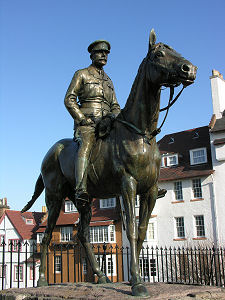 A British Trench During the Battle of the Somme. Note About Image Copyright |
Douglas Haig, 1st Earl Haig lived from 19 June 1861 to 29 January 1928. A professional solider, he was commander of the British forces in France and Belgium during the latter half of the First World War, and he remains a highly controversial figure. The wider picture in Scotland at the time is set out in our Historical Timeline.
Haig was born in Edinburgh, the son of John Haig, who ran the family's successful whisky distillery. He was educated at Clifton College, Bristol, and Brasenose College, Oxford, before joining the Army in 1884 and attending the Royal Military College at Sandhurst.
Douglas Haig was commissioned into the 7th (Queen's Own) Hussars in 1885, being promoted rapidly to Lieutenant, then to Captain in 1891. He served with his regiment in India in 1887, and first saw active service under Lord Kitchener in Sudan in 1898. Haig served in a number of positions during the Boer War, including as Chief Staff Officer to Major-General John French and as Assistant Adjutant General of the Cavalry Division. In 1901, Haig took command of the 17th Lancers, a position he held for two years while also acting as Aide-de-Camp to King Edward VII. He then went to India once more, after Lord Kitchener had been appointed Commander-in-Chief there.
Haig returned to England to take up posts as Director of Military Training in 1906 and as Director of Staff Duties in 1907. During this time he helped restructure the Army with the intention of changing its emphasis away from colonial wars and more towards the European war that was now looking increasingly likely. Further advancement swiftly followed, with his appointment as Chief of the General Staff in India in 1909; a promotion to lieutenant-general in 1910; appointment as General Officer Commanding the Aldershot region from 1912 to 1914; and then becoming Aide-de-Camp to King George V. The only negative note in an otherwise glowing career arose when in large scale Army manoeuvres in September 1912, forces under his command were soundly beaten by those of Lieutenant-General Sir James Grierson, despite the odds being in Haig's favour.
At the outbreak of World War One, Haig commanded I Corps, half of the British Expeditionary Force (BEF) under the overall command of Field Marshal John French. During this period Haig worked tirelessly to undermine French's authority, going as far telling King George V that French was "a source of great weakness to the army and no one had confidence in him any more" In December 1915 Haig replaced French as commander of the BEF, with Field Marshal French returning to the UK to take charge of home based forces.
Under Haig's command the BEF embarked on a number of major campaigns that involved huge British and Allied (and German) loss of life, including the British offensive on the Somme and the 3rd Battle of Ypres. Even the Prime Minister of the day, Lloyd George, expressed the view that Haig's strategy incurred unnecessarily large casualties for very little gain. Nonetheless, Haig was promoted to Field Marshal in 1917. In 1918 the Germans launched their final assault of the war, the Ludendorff Offensive: it proved disastrous for them. Between 18 July 1918 and the end of the war, the French, American and Belgian armies between them captured 196,700 German prisoners and 3,775 guns: while Haig's forces, with less manpower than the French, captured 188,700 prisoners and 2,840 guns. Some have described this as the greatest victory in British military history: others feel its value was diminished against the backdrop of the vast losses sustained by the BEF until then.
After the war, Haig was created Earl Haig and given the huge sum of £100,000 by a grateful nation. He retired from the Army in 1920 and went on to establish the Haig Fund for the financial assistance of ex-servicemen. He also helped set up the Royal British Legion, and was president of the United Services Fund. He died in 1928 at the age of 66 and, after a state funeral attended by over 100,000 people, he was buried at Dryburgh Abbey.
After 90 years, the controversy surrounding's Haig strategy in World War One remains undimmed. Was he the "Butcher of the Somme" who needlessly squandered hundreds of thousands of allied lives? Or was he, as the General of the Armies of the United States, John Pershing, said, "the man who won the war"? Perhaps the most balanced view is that he recognised the reality of the situation: that the stalemate of the Western Front left only one option, a ghastly war of attrition that the Germans would simply be unable to sustain for as long as the allies.


